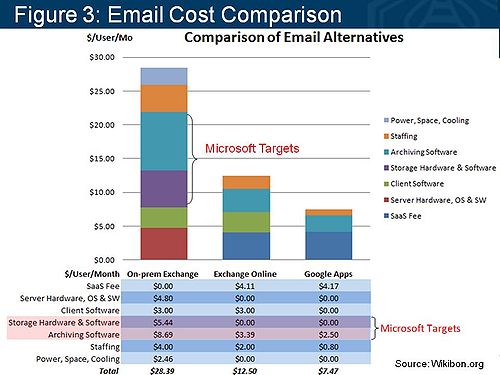Earlier this year we published results from a major research initiative trying to understand the impact of Google Apps on traditional on-premise deployment models. On a high level, key findings of that research indicate that:
- Google Apps is becoming a major contributor to organizations looking for next-generation collaborative software.
- The cost of Google Apps deployments is substantially lower than those of traditional on-premise deployment models.
- Microsoft is making aggressive moves to reduce its costs, offer on-demand models, and stave off competition from Google.
- These attempts, while noble, will not be sufficient to thwart inroads made by Google Apps.
- Tradeoffs of moving to Google Apps include security, manageability, and concerns over Google's service level agreements.
However, as Wikibon's Mike Versace wrote:
"Since this original posting, we've discovered an interesting security and privacy trade-off when comparing the use of Microsoft email and Google apps for collaboration and information sharing use cases. To be specific, some users view the use of Google apps for document collaboration and sharing among business units to be more secure and less risky than the use of email for the same purpose. The theory is that when used with a strong identity and access management practice, Google apps is better at keeping track of who has access to information, how the information is used, and where all copies of a document, spreadsheet, etc. are located."
This is the message the Wikibon community heard from Lincoln Cannon of Merit Medical on the 8/3/2010 Peer Incite Research Meeting. Merit's sales teams drove the use of Google Apps as a collaboration tool which enabled new business momentum for the organization. Issues around security and manageability were addressed using Symplified's tool set, which provides single sign-on and improved security and manageability for cloud-based apps (SaaS).
Specifically, Merit employees spent less than 100 person hours for the initial deployment at an end cost of about $1 per user, per application, per month for authentication, single sign-on, role based access control, and audit across enterprise and SaaS-base applications. This sends a very strong message, especially to small-to-mid-sized organizations-- cloud services are faster to deploy, cheaper, easier to manage and potentially more secure than existing infrastructure.
Further, our research indicates that the economics of Cloud-based apps still heavily favor Google when compared to Microsoft on-premise offerings, from both a CAPEX and OPEX point of view. While our analysis below looks only at Gmail as compared to Exchange 2010, indications are that adding security and management capabilities such as those offered by Symplified will increase the Cloud cost equation by approximately $1/user/app/month. Based on the cost models we've re-published below in Figure 1:
- Analysis of 10,000 seat deployments. Function and pricing vary between on-premise and cloud offerings. Cloud archiving and spam filtering software: Microsoft- Exchange Hosted Archive; Google- Postini.
- Google Apps costs are $50/user/year for 25GB of email storage. Google’s archiving/spam filtering service costs (Google Message Discovery/Postini) are $45/user/year ($30 for volume customers) and include unlimited storage for ten years.
- For archiving, Google provides RAID-protected disk storage located in two geographically distinct locations. Google claims to index message data and then write it to two separate locations for long-term storage.
This analysis underscores why Microsoft’s Exchange group is motivated to try to attack the two biggest culprits of on-premise costs: storage and archiving. But as Google and its partners improve security, the biggest perceived weakness of Google Apps, Microsoft’s strategy will likely fall short. According to Google, more than 25M people use Google Apps, far fewer of course than use Microsoft Office but the growth rates for Google are astronomical.
The bottom line is Cloud-based apps are hitting the mainstream, and solutions from firms like Symplified are lowering the risk of deployment and allowing firms to achieve a much faster (orders of magnitude faster) time-to-market.
Action Item: Cloud apps in general and Google Apps specifically are increasingly becoming staples of small-to-mid-sized firms. Concerns over security, manageability, and access are being addressed by emerging tools such as those offered by Symplified. As is the case with Merit Medical, initiatives are being driven by lines-of-business, and IT organizations must put themselves in a position to provide security solutions for SaaS offerings that protect the firm and at the same time enable the fast delivery of business value.
Footnotes:



